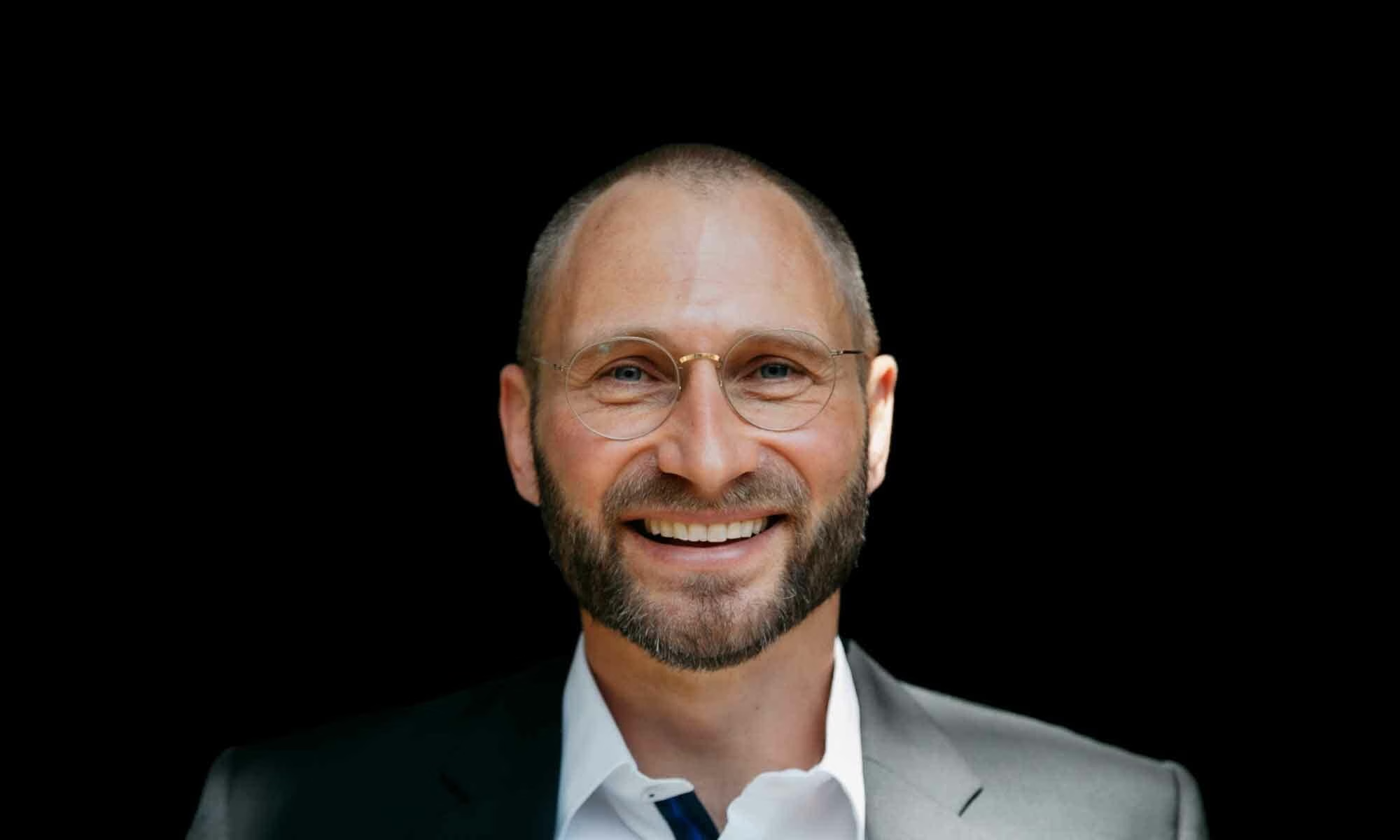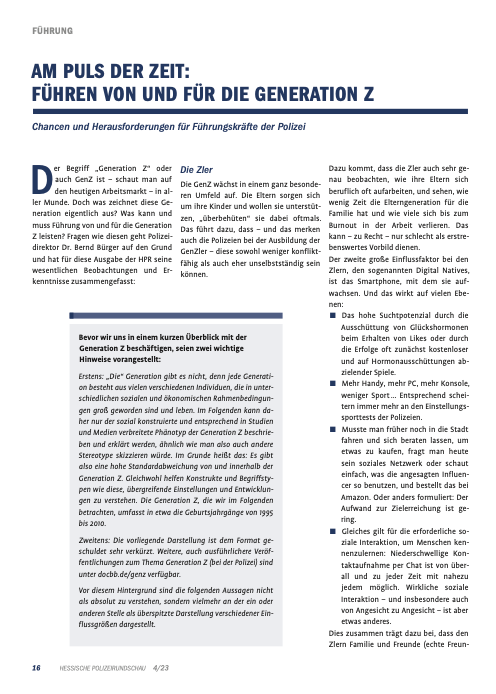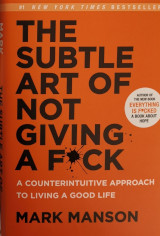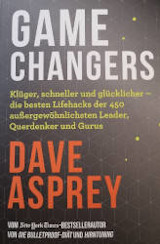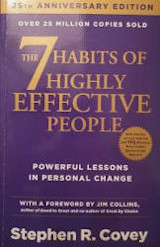Hot off the press in the Hesse Police Magazine: my new article on Generation Z - also available here for download with kind permission. Read/Download:
Police work organization and its effects on (in)security in public spaces
Full version - shortened article published by the German Society for Time Policy, Zeitpolitisches Magazin No. 36 July 2020 (ISSN 2196-0356, download here).
"We stand up for people's safety and provide help around the clock."1Bavarian State Ministry of the Interior, Leitbild der Bayer. Polizei - Handlungs- und Orientierungsrahmen für die Zukunft, https://www.polizei.bayern.de/wir/leitbild/index.html/3249, accessed on 01.03.2020
This quote from the mission statement of the Bavarian Police undoubtedly applies to all police authorities - they guarantee security in a society around the clock. Although the work is 24/7224/7 stands for 24 hours, 7 days a week, i.e. the provision of work every day at any time. This is not a unique feature of police work, as around one in six employees in Germany works shifts (Radtke 2020), but it is characteristic of police work. In order to understand the (time) organization of police work and its impact on public safety, it is also necessary to understand the effects that shift work, which is necessary to ensure the constant availability of the police, has on people. Even if some police working time organizers do not seem to take this into account, police officers are also human beings and the organization of shift work has a significant influence on their ability to perform and act and thus directly on (in)security in public spaces.
Continue reading „Arbeitsorganisation bei der Polizei und ihre Wirkungen auf (Un)Sicherheit im öffentlichen Raum“The Subtle Art of Not Giving a F*ck
A Counterintuitive Approach to Living a Good LifeAs the title suggests, Manson wants his book to stand out from the usual life advice books. Because these usually emphasize what you could or should achieve - higher, faster, further (see, for example, the book "How to achieve more"). Game Changers). The downside, however, is that you are made very aware of what you have not achieved so far. You haven't achieved this or that, you're not exceptional. And the usual (American?) life guides are all aimed at helping you to finally be extraordinary and achieve all your goals.
In his book, Manson shows a different path to personal success. The book is also available in German ("The subtle art of shitting on it“ view at Amazon), but with this book in particular it should be almost impossible to convey the "spirit" of the book correctly in German. While "to give a fuck" is ambiguous in English and the author uses the expression creatively, that alone is difficult in German. Let's see if I have succeeded.
Continue reading „The Subtle Art of Not Giving a F*ck“#Instacops - private Instagram account as a police officer?
Comment of a scientist and police officer.
Published on 24.05.2020 in German Police, 06/20, p. 20 ff

Some of my presentations on Generation Z also deal with the private accounts of police officers on social media if they are recognizable there as a "cop". The handling of these so-called #instacops varies greatly depending on the authority and federal state. In some police forces, for example, photos with uniforms on a private account are subject to disciplinary review, as this photo must supposedly have been taken while on duty.
Continue reading „#Instacops – privater Instagram Account als Polizist*in?“Does THE Generation Z exist? Generations vs. sinus milieus.

Is there actually "DIE" Generation Z? A good question, especially once you have studied the Sinus-Milieus. The Sinus Institute (Sinus Markt- und Sozialforschung GmbH) has specialized in the complex analysis of society for over 40 years. And one thing becomes clear from this analysis: the world in which young people live is also very differentiated (as you would expect).
The Sinus-Milieus
Researchers at the Sinus Institute survey various target groups in so-called life-world explorations with regard to their values, attitudes, life goals, lifestyle and social background, among other things. This data is analyzed and various clusters can be formed. These groups of like-minded people are referred to as milieus. In order to obtain a broader picture, quantitative data is also collected using a standardized questionnaire. In this way, an attempt is made to obtain as realistic a picture as possible of the socio-cultural diversity in the population under investigation, e.g. young people in Germany. Thanks to its many years of work in this field, the Institute can draw on a wealth of historical data and thus also highlight changes (longitudinal studies). The following short video provides a brief but very informative insight into the German milieus.
Continue reading „Gibt es DIE Generation Z? Generationen vs. Sinus-Milieus.“Generation Z - the dark side of digitalization
A short article on the downsides of digitization including a video link.
A large proportion of Generation Z, also known as mobile natives, are experts at using smartphones - no wonder, they grew up with them. If you have children of your own, you have certainly observed that the little ones already know how to unlock smartphones and swipe around on them in their first year of life. That's how intuitive the system is. And right from the start, the children see how much time mom and dad spend in front of their little screens - on walks with the children or on the bench at the playground. In this way, parents are already shaping their children's relationship with the smartphone.
Incidentally, Generation Zers also differ from their predecessor generation, the millennials (also known as digital natives), who did not grow up with smartphones but "only" with PCs. On the one hand, many of Generation Z are considered multitaskers² and can work with up to five screens at the same time. Millennials still have two screens, so in this respect, Zlers seem to be a kind of Millennials on a natural speed.
Continue reading „Generation Z – Schattenseiten der Digitalisierung“Game changers - the best life hacks
Smarter, faster and happier - the best life hacks from the 450 most extraordinary leaders, lateral thinkers and gurus. The 46 laws of success. Insights into: "Game Changers" by Dave Asprey.
Eisenhower 2.0 or 7 ways to effectiveness
What attitudes or habits do highly effective people have?
Insights into: "The 7 Habits of Highly Effective People. Powerful lessons in personal change." by Stephen R. Covey. Also available in German.
Absolutely worth reading, the author guides you well through his book and cleverly forces you to think about yourself. And he focuses on the individual - whether employee or manager, friend or family member. If you have already dealt with the topics of leadership and self-organization, some things will seem familiar. However, these are often placed in a very interesting context (e.g. Eisenhower 2.0).
Atomic Habits: Changing habits
How to achieve big effects and goals with small changes.
Insights into the book "Atomic Habits - Tiny Changes, Remarkable Results. An Easy and Proven Way to Build Good Habits and Break Bad Ones" by James Clear.
If you don't fancy reading in English, the book will also be available in German from 21.4. German - view at Amazon.
BEMM - Effective and efficient mindstorming for larger groups
Moderation technique: How to collect and present the swarm knowledge of larger groups effectively and efficiently.
A few years ago, I gave lectures at the DHPol on the subject of Police & Science, each time to at least one study group, often to two combined groups, i.e. 25 to 50 students. However, I found it important to involve the "audience" in this very exciting and often controversial topic. For this reason, I came up with this method and it has become my favorite method for collecting opinions, ideas, etc. very efficiently, even in larger groups. It is also often very funny to implement - I'll explain why in a moment.
Continue reading „BEMM – Effektives und effizientes Mindstorming für größere Gruppen“